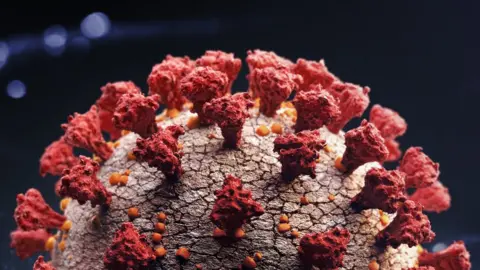UK finds more coronavirus cases with 'concerning' mutations
 Getty Images
Getty ImagesPublic Health England is investigating cases of coronavirus with 'worrying' new genetic changes that have been found in some regions of the UK.
Tests show they have a mutation, called E484K, that is already seen in the South Africa variant.
Although this change may reduce vaccine effectiveness, the current ones in use should still work, say experts.
There have been 11 cases in Bristol and a cluster of 32 cases in Liverpool.
Urgent testing for the South Africa variant is already starting in parts of England and could be rolled out to other areas seeing different variants with the same E484K mutation.
Scientists working with Public Health England found a small number of cases of the UK 'Kent' variant with the E484K mutation - it was seen in 11 out of 214,159 samples that they tested, and predominantly from the South West of England.
It is likely there may be more cases that haven't yet been found. The Liverpool area has seen 32 cases of original coronavirus that have the E484K mutation too.
It's not unexpected that variants are appearing or that they will continue to change - all viruses mutate as they make new copies of themselves to spread and thrive.
Dr Julian Tang, a virus expert at the University of Leicester, described the finding as "a worrying development, though not entirely unexpected".
He said it was important people follow the lockdown rules and get cases of coronavirus down to prevent opportunities for the virus to mutate further.
"Otherwise not only can the virus continue to spread, it can also evolve."
He said that allowing spread could allow a "melting pot" for different emerging variants.
Scientists have already been checking what these new mutations might mean for existing coronavirus vaccines that were designed around earlier versions of the virus that started the pandemic.
Some research appears to show E484K may help the virus evade parts of the immune system called antibodies.
But early results from Moderna suggest its vaccine is still effective against variants with this mutation - although the body's immune response may not be as strong or prolonged.
Two new coronavirus vaccines that could be approved soon - one from Novavax and another from Janssen - also appear to offer good cover against variants, protecting against serious illness.
Even in the worst case scenario, vaccines can be redesigned and tweaked to be a better match in a matter or weeks or months, if necessary, say experts.
A silver lining may be that the variants are mutating in a similar way rather than diverging from each other.
Prof Ravi Gupta from the University of Cambridge said: "This gives us a sign that it has certain favoured routes - and we can work to block those off with a vaccine."
Former UK health secretary Jeremy Hunt said the race was on to vaccinate as many people as quickly as possible in order to keep a step ahead of the virus.
Measures such as washing your hands, keeping your distance from other people and wearing a face covering will still help prevent infections.